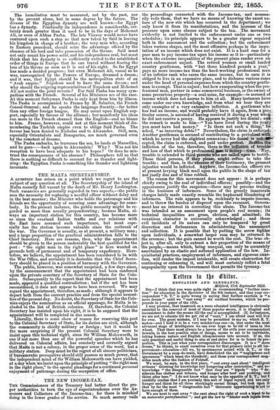THE NEW INCOME-TAX.
DIE Commissioners of the Treasury had better direct the pro- per authorities to turn the eye of superintendence over the As- sessors and Collectors of the Income-tax; for there is mischief doing in the lower grades of the service. So much secrecy veils the proceedings connected with the Income-tax, and necessa- rily veils them, that we have no means of knowing the exact na- ture of thc new stir which has occurred in the department; we only know it from its manifestations, and the increase of the pressure upon some classes subject to the tax. The movement evidently is not limited to the enforcement under one or two schedules ; its principle appears to be a greater rigour required both in the assessment and the collection; but the enforcement takes various shapes, and the most offensive perhaps is the impu- tation of an income which does not exist. It is a hard case for a poor man to pay income-tax upon his income as it is—particularly when the extreme inequalities of the present plans render even an exact enforcement unjust. The retired yeoman or small landed country gentleman, with "but three hundred pounds a year," pays no more income-tax than the hard-working professional man of an inferior rank who earns the same income, but to earn it is obliged to live in an expensive place, and to disburse various sums under the head of personal expenses from which the country gentle- man is exempt. That is unjust • but how exasperating when the pro- fessional man, partner in some commercial business, or the owner of some precarious property—a coal-mine, for example—is accused of income which does not accrue to him at all. Many instances have come under our own knowledge, and from what we hear they are only examples of a very extensive infliction. A gentleman who has had an income, and would probably have it again, from a par.; ticular source, is accused n sed of having received it during a year whea he did not receive a penny. He appears to justify his denial ; aria the remark is made to him—" You have lived during the yeae; you must have had money." "Is there not such a thing," he asked, "as incurring debts?" Nevertheless, the claim is enforced. • Another gentleman is accused of contributing to a periodical with which he never had the slightest connexion-; his denial is 'nota.4111.- cepted, the claim is enforced, and paid under protest. Beifires.the infliction of the tax, therefore, there is the initetio'n of trouble- and loss of that which to profession aboan iiiiienei—time. Nay, trouble is extended to third persons who are called upon to testify. Those third persons, if they please, might refuse to take the trouble ; and then, in the absenee Of thew testimony, the grossest injustice would be inflicted. Anyhow, the Income-tax officers are at present levying black mail upon the public in the shape of tax not justly due and of time robbed. The reason for this movement does not appear : it is perhaps chiefly owing to the zeal of individual officers; possibly—and the justify ustify the suspicion—there may be persons trading in the business of informers. Some of the grossly inaccurate charges lately made exactly resemble the haphazard blundering of informers. The rule appears to be, recklessly to impute income, and to throw the burden of disproof upon the recusant. Govern- ment has an interest in correcting this abuse. The Income-tax was intended as an assessment upon people's real means ; its technical inequalities are gross, obvious, and admitted; its vexatious character is universally acknowledged ; and these evil incidents of its nature can only be tempered by great
discretion and forbearance in administering the• assessment and collection. It is possible that by putting the screw tighter upon individuals, a somewhat larger sum may be returned to the revenue ; but the gain cannot be worth the cost. The true ob- ject is, after all, only to extract a fair proportion of the means of the people,—means which, being unequal, can only be accurately ascertained by an elastic and softened application of the law. In- quisitorial practices employment of informers, and rigorous exac- tion, will render the impost intolerable, will create obstruction for continuing or enhancing it, and will most certainly inflict a fatal unpopularity upon the Government that permits" the tyranny.


























 Previous page
Previous page